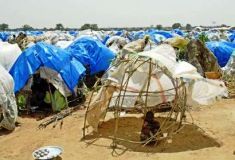In Darfur, three from Boston see horrors firsthand
By Steven Rosenberg, The Boston Globe
Feb 25, 2005 — Liz Walker, the longtime Boston TV news anchorwoman, was standing in the middle of a sea of straw huts in a Darfur refugee camp, peering into a closet-sized shelter where six people live.

|
|
A displaced Sudanese girl sits inside a temporary shelter at Sreef camp near Nyala in south Darfur, October 8 , 2004. |
In the midst of a recent fact-finding trip in which she had heard harrowing accounts of burned villages and gang rapes, Walker looked out at the tortured, parched earth of Sudan, where internal fighting has claimed the lives of 70,000 people and made 2 million homeless. For a long moment, she was overwhelmed by a sense of helplessness.
”When I think about it, it just tears me up,” said Walker, who returned earlier this month from the trip and is filming a documentary about Sudan.
Accompanying Walker were Dr. Gloria White-Hammond, a Boston pediatrician active in Sudan, and Linda Mason, a member of the board of directors of Mercy Corps, an international humanitarian agency that has relief workers in the Darfur camps.
The Boston women declined to name the two camps they visited, fearing government retribution against humanitarian aid workers and refugees.
The 60 women they met in the camps told stories of a lawless land, where an atmosphere of intimidation and fear has settled on western Sudan since 2003, when rebels began fighting against the Sudanese government. The now homeless Darfur women say they will never forget the faces of the government-sponsored Arab marauders known as Janjaweed — Arabic for devils on horseback — who roam the country at will, burn villages, kill Africans, and often gang-rape women and young girls.
Mason, who is also on the board of The Boston Globe, plans to relay these stories to legislators and policy makers. She’s trying to set up a meeting with Secretary of State Condoleezza Rice within the next month. The three women will also talk about their trip at a forum at the Massachusetts College of Art on March 23.
Mason’s message is clear: Stop the fighting, greatly increase the number of African Union troops that are stationed in Darfur, currently just 1,400; provide counseling to the thousands of women and children who have been raped and beaten; and teach the refugees new skills so they can find work in nearby villages.
”This is a long-term problem,” warned Mason. ”These internally displaced persons are not leaving anytime soon.”
Walker questioned whether world leaders had put enough pressure on the Sudanese government to stop the fighting. While she was in Darfur the killing continued, with several villages burned to the ground. She said she wondered if the response would have been the same if a similar catastrophe had occurred in another country.
”I think there’s definitely a racial element to it. There always has been, and it’s really sad,” said Walker. ”I remember that I read that President Clinton said, ‘Never again,’ and President Bush said, ‘Not on my watch,’ and there’s something happening there now, so horrific, that we need to stop it, and nobody seems to be stopping it.”
Appearing before the Senate Foreign Relations Committee last September, then-secretary of state Colin L. Powell said ”genocide has been committed” in Darfur.
Last month, an independent commission submitted a report to UN Secretary General Kofi Annan detailing human rights abuses by the Sudanese government and its sponsored militias, recommending that charges be brought in the International Criminal Court.
”This report demonstrates, beyond all doubt, that the last two years have been little short of hell on earth for our fellow human beings in Darfur,” Annan said last week.
Mason said she believes that the abuse of women is the biggest tragedy to occur in the conflict. ”Every woman we had talked to either had been raped or knew someone that had been raped,” she said. ”They were so open with us. They would drop their robes to show us scars all over their arms and legs and backs. They had been beaten and raped — and most of them gang-raped. Their daughters had been raped. Their lives are shattered.”
She said the threat of rape by the Janjaweed still hovers over the women, who frequently leave the camps to look for firewood and seek menial jobs in nearby villages.
White-Hammond, who along with Walker founded My Sister’s Keeper, a humanitarian action group in southern Sudan, said that polio had been a major cause of concern in the past month in Darfur, but other issues, such as malnutrition, had been decreasing.
The scars of rape and the pain of losing a husband or a child are retold daily in the tent city. White-Hammond remembers the tears of a woman who showed her scars and told of being gang-raped. ”The two of us embraced — her unloading and me sharing some of that pain — and it was just so raw,” said White-Hammond.
Music has soothed the women’s souls. After each meeting with the Sudanese women, the refugees would break into spontaneous song. Many songs dealt with rape and beatings, with the women lashing out at their attackers.
On their last day at one of the camps, the Boston women played a CD of music written especially for the refugees by Berklee College of Music students. Sitting on a straw mat on the desert floor, the women gathered around a laptop computer to listen to the music. ”We have not forgotten you, we have not forgotten your pain, we have not forgotten your suffering,” an interpreter told the refugees, translating the lyrics of Berklee student Farah Siraj into Arabic.
Steven Rosenberg can be reached at [email protected].
